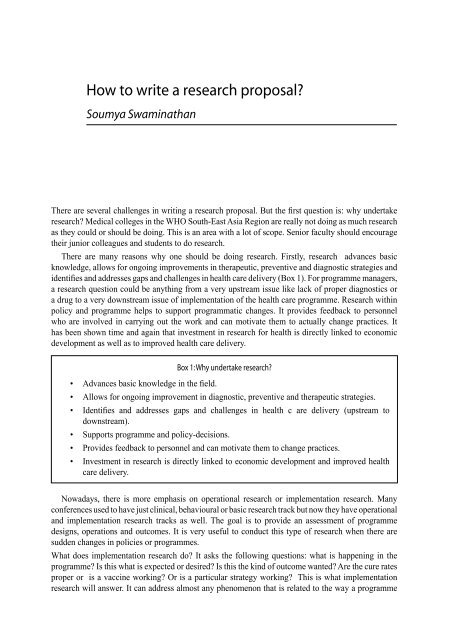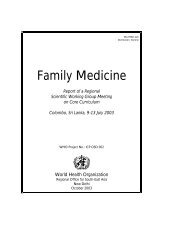South-East Asia Regional Conference on Epidemiology
South-East Asia Regional Conference on Epidemiology
South-East Asia Regional Conference on Epidemiology
Create successful ePaper yourself
Turn your PDF publications into a flip-book with our unique Google optimized e-Paper software.
How to write a research proposal?<br />
Soumya Swaminathan<br />
There are several challenges in writing a research proposal. But the first questi<strong>on</strong> is: why undertake<br />
research? Medical colleges in the WHO <str<strong>on</strong>g>South</str<strong>on</strong>g>-<str<strong>on</strong>g>East</str<strong>on</strong>g> <str<strong>on</strong>g>Asia</str<strong>on</strong>g> Regi<strong>on</strong> are really not doing as much research<br />
as they could or should be doing. This is an area with a lot of scope. Senior faculty should encourage<br />
their junior colleagues and students to do research.<br />
There are many reas<strong>on</strong>s why <strong>on</strong>e should be doing research. Firstly, research advances basic<br />
knowledge, allows for <strong>on</strong>going improvements in therapeutic, preventive and diagnostic strategies and<br />
identifies and addresses gaps and challenges in health care delivery (Box 1). For programme managers,<br />
a research questi<strong>on</strong> could be anything from a very upstream issue like lack of proper diagnostics or<br />
a drug to a very downstream issue of implementati<strong>on</strong> of the health care programme. Research within<br />
policy and programme helps to support programmatic changes. It provides feedback to pers<strong>on</strong>nel<br />
who are involved in carrying out the work and can motivate them to actually change practices. It<br />
has been shown time and again that investment in research for health is directly linked to ec<strong>on</strong>omic<br />
development as well as to improved health care delivery.<br />
•<br />
•<br />
•<br />
•<br />
•<br />
•<br />
Box 1: Why undertake research?<br />
Advances basic knowledge in the field.<br />
Allows for <strong>on</strong>going improvement in diagnostic, preventive and therapeutic strategies.<br />
Identifies and addresses gaps and challenges in health c are delivery (upstream to<br />
downstream).<br />
Supports programme and policy-decisi<strong>on</strong>s.<br />
Provides feedback to pers<strong>on</strong>nel and can motivate them to change practices.<br />
Investment in research is directly linked to ec<strong>on</strong>omic development and improved health<br />
care delivery.<br />
Nowadays, there is more emphasis <strong>on</strong> operati<strong>on</strong>al research or implementati<strong>on</strong> research. Many<br />
c<strong>on</strong>ferences used to have just clinical, behavioural or basic research track but now they have operati<strong>on</strong>al<br />
and implementati<strong>on</strong> research tracks as well. The goal is to provide an assessment of programme<br />
designs, operati<strong>on</strong>s and outcomes. It is very useful to c<strong>on</strong>duct this type of research when there are<br />
sudden changes in policies or programmes.<br />
What does implementati<strong>on</strong> research do? It asks the following questi<strong>on</strong>s: what is happening in the<br />
programme? Is this what is expected or desired? Is this the kind of outcome wanted? Are the cure rates<br />
proper or is a vaccine working? Or is a particular strategy working? This is what implementati<strong>on</strong><br />
research will answer. It can address almost any phenomen<strong>on</strong> that is related to the way a programme









